File Info
| Exam | Android Application Development |
| Number | AND-401 |
| File Name | Android.AND-401.Pass4Sure.2018-06-23.137q.vcex |
| Size | 249 KB |
| Posted | Jun 23, 2018 |
| Download | Android.AND-401.Pass4Sure.2018-06-23.137q.vcex |
How to open VCEX & EXAM Files?
Files with VCEX & EXAM extensions can be opened by ProfExam Simulator.
Coupon: MASTEREXAM
With discount: 20%
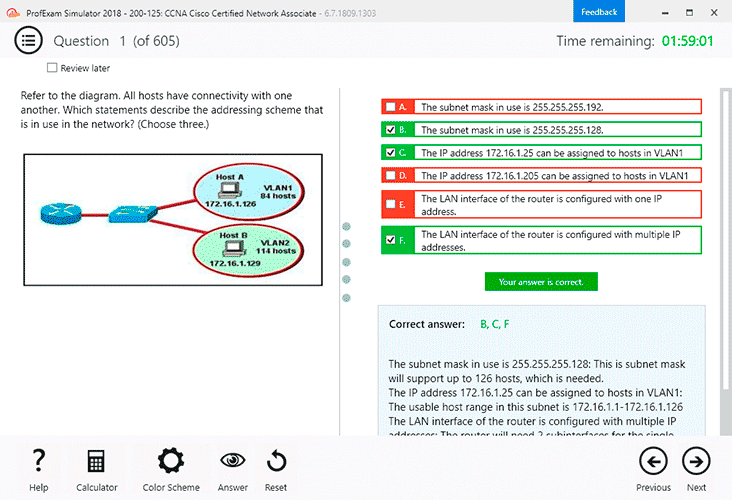
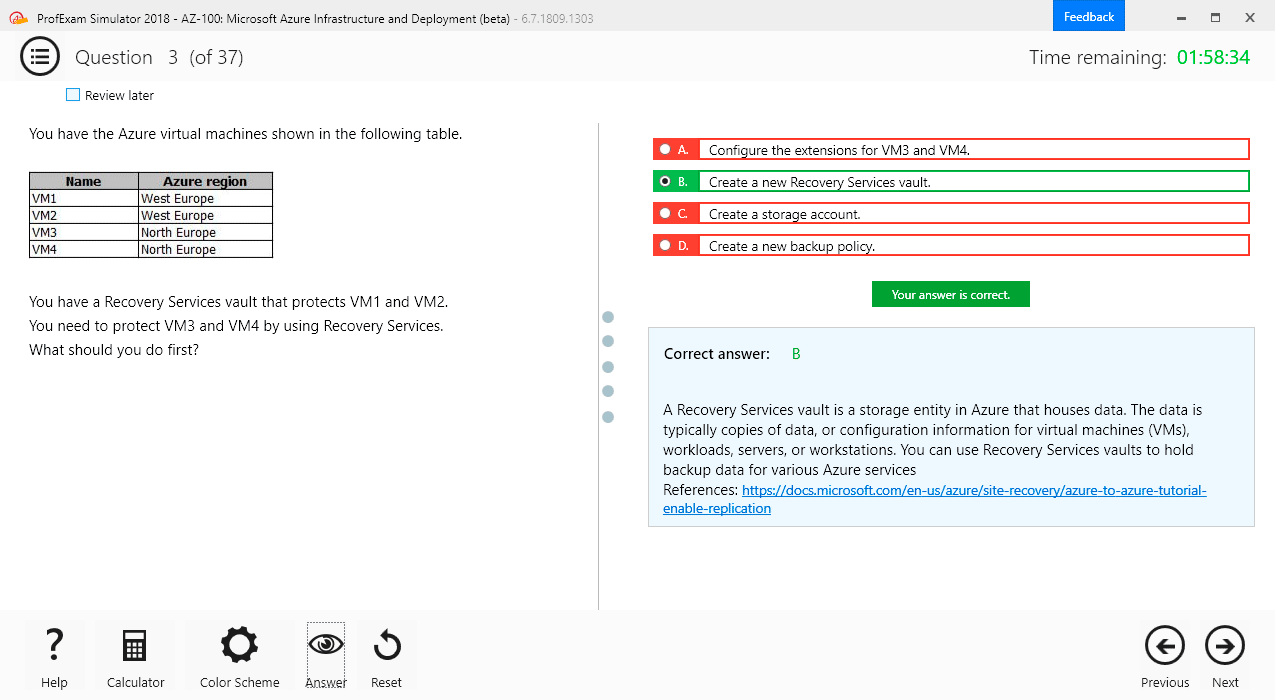
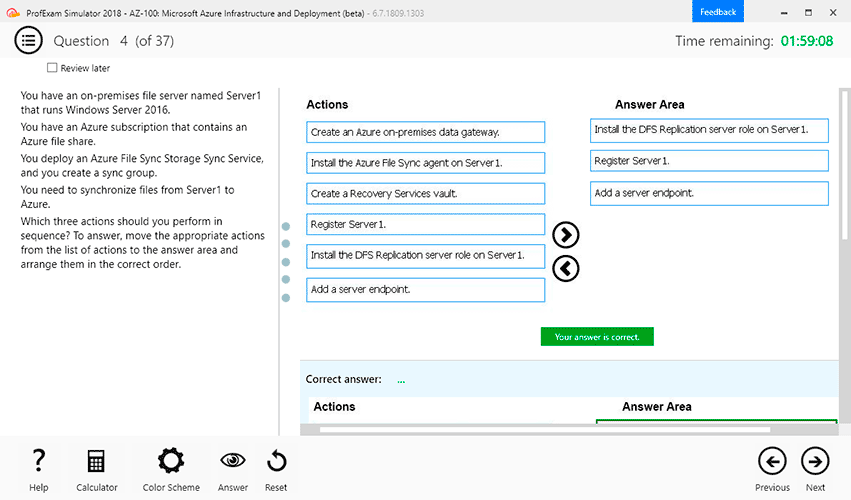
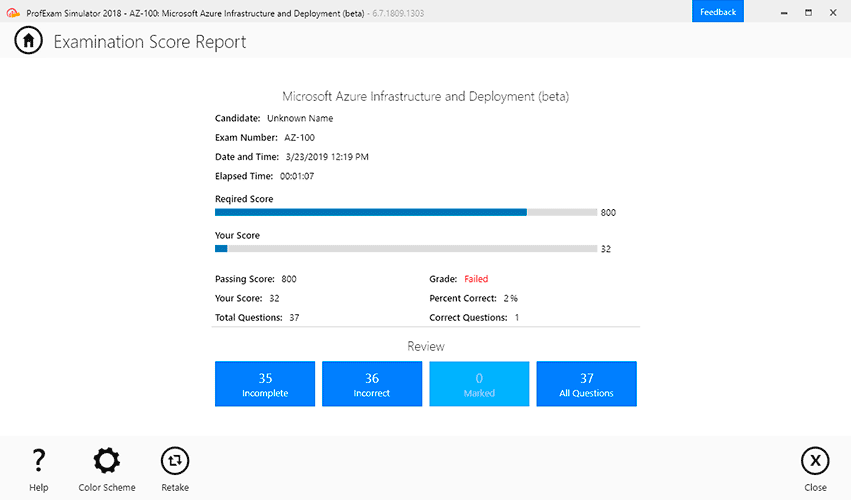
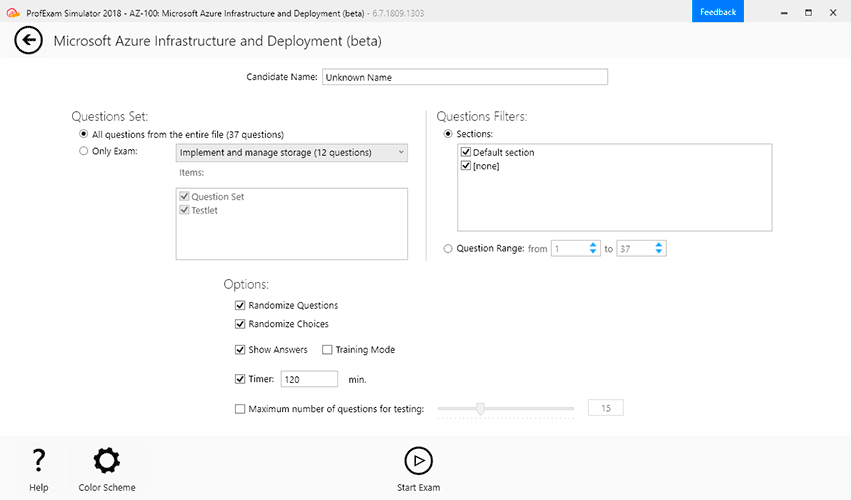
Demo Questions
Question 1
Which of the following Activity life-cycle methods is called once the activity is no longer visible?
- onStop
- onPause
- onDestroy
- onHide
Correct answer: A
Explanation:
References:Android ATC Self Study Guide http://www.androidatc.com/pages-19/Self-Study References:
Android ATC Self Study Guide http://www.androidatc.com/pages-19/Self-Study
Question 2
Which of the following is a correct Android Manifest statement?
- <uses-permission android:name =”android.Internet”/>
- <uses-permission android:name =”android.Internet”></uses-permission>
- <uses-permission android:name =”android.permission.Internet”>
- <uses-permission android:name =”android. permission .Internet”/>
Correct answer: D
Explanation:
References:Android ATC Self Study Guide http://www.androidatc.com/pages-19/Self-Study References:
Android ATC Self Study Guide http://www.androidatc.com/pages-19/Self-Study
Question 3
Which of the following is true about attribute android:windowSoftInputMode of the <activity> tag in file AndroidManifest.xml?
- It specifies whether the window is in full screen or not
- It adjusts how the main window of the activity interacts with keyboard
- It adjusts how the window should be launched
- It adjusts the window orientation
Correct answer: B
Explanation:
References:Android ATC Self Study Guide http://www.androidatc.com/pages-19/Self-Study References:
Android ATC Self Study Guide http://www.androidatc.com/pages-19/Self-Study
Question 4
Which of the following tools dumps system log messages including stack traces when the device or emulator throws an error?
- DDMS
- Logcat
- Console
- ADB
Correct answer: B
Explanation:
References:Android ATC Self Study Guide http://www.androidatc.com/pages-19/Self-Study References:
Android ATC Self Study Guide http://www.androidatc.com/pages-19/Self-Study
Question 5
Javascript is enabled by default in a WebView
- True
- False
Correct answer: B
Explanation:
If the web page you plan to load in your WebView use JavaScript, you must enable JavaScript for your WebView. References:http://developer.android.com/guide/webapps/webview.html If the web page you plan to load in your WebView use JavaScript, you must enable JavaScript for your WebView.
References:
http://developer.android.com/guide/webapps/webview.html
Question 6
How to enable JavaScript in WebView?
- myWebView. setJavaScriptEnabled(true);
- myWebView.getJavaScriptSettings.setEnabled(true)
- myWebView.getSettings().setJavaScriptEnabled(true);
- Java script is always enabled in WebView
Correct answer: C
Explanation:
JavaScript is disabled in a WebView by default. You can enable it through the WebSettings attached to your WebView. You can retrieve WebSettings with getSettings(), then enable JavaScript with setJavaScriptEnabled(). For example:WebView myWebView = (WebView) findViewById(R.id.webview); WebSettings webSettings = myWebView.getSettings(); webSettings.setJavaScriptEnabled(true); References:http://developer.android.com/guide/webapps/webview.html JavaScript is disabled in a WebView by default. You can enable it through the WebSettings attached to your WebView. You can retrieve WebSettings with getSettings(), then enable JavaScript with setJavaScriptEnabled().
For example:
WebView myWebView = (WebView) findViewById(R.id.webview);
WebSettings webSettings = myWebView.getSettings();
webSettings.setJavaScriptEnabled(true);
References:
http://developer.android.com/guide/webapps/webview.html
Question 7
What two methods you have to override when implementing Android context menus?
- onCreateOptionsMenu, onCreateContextMenu
- onCreateContextMenu, onContextItemSelected
- onCreateOptionsMenu, onOptionsItemSelected
- onCreateOptionsMenu, onContextItemSelected
Correct answer: B
Explanation:
need to create context menu. For this need to override this method:@Override public void onCreateContextMenu(ContextMenu menu, View v, ContextMenuInfo menuInfo) { super.onCreateContextMenu(menu, v, menuInfo); menu.setHeaderTitle("My Context Menu"); menu.add(0, NEW_MENU_ITEM, 0, "new"); menu.add(0, SAVE_MENU_ITEM, 1, "save"); } And last one need to handle menu clicks:@Override public boolean onContextItemSelected(MenuItem item) { switch (item.getItemId()) { case NEW_MENU_ITEM: doSomething(); break; case SAVE_MENU_ITEM: doSomething(); break; } return super.onContextItemSelected(item); } References:https://thedevelopersinfo.wordpress.com/2009/11/06/using-context-menus-in-android/ need to create context menu. For this need to override this method:
@Override
public void onCreateContextMenu(ContextMenu menu, View v, ContextMenuInfo menuInfo) {
super.onCreateContextMenu(menu, v, menuInfo);
menu.setHeaderTitle("My Context Menu");
menu.add(0, NEW_MENU_ITEM, 0, "new");
menu.add(0, SAVE_MENU_ITEM, 1, "save");
}
And last one need to handle menu clicks:
@Override
public boolean onContextItemSelected(MenuItem item) {
switch (item.getItemId()) {
case NEW_MENU_ITEM:
doSomething();
break;
case SAVE_MENU_ITEM:
doSomething();
break;
}
return super.onContextItemSelected(item);
}
References:
https://thedevelopersinfo.wordpress.com/2009/11/06/using-context-menus-in-android/
Question 8
What two methods you have to override when implementing Android option menus?
- onCreateOptionsMenu, onCreateContextMenu
- onCreateContextMenu, onContextItemSelected
- onCreateOptionsMenu, onOptionsItemSelected
- onCreateOptionsMenu, onContextItemSelected
Correct answer: C
Explanation:
To specify the options menu for an activity, override onCreateOptionsMenu(). When the user selects an item from the options menu (including action items in the app bar), the system calls your activity's onOptionsItemSelected() method. This method passes the MenuItem selected. You can identify the item by calling getItemId(), which returns the unique ID for the menu item (defined by the android:id attribute in the menu resource or with an integer given to the add() method). You can match this ID against known menu items to perform the appropriate action. For example:@Override public boolean onOptionsItemSelected(MenuItem item) { Etc. References:http://developer.android.com/guide/topics/ui/menus.html To specify the options menu for an activity, override onCreateOptionsMenu().
When the user selects an item from the options menu (including action items in the app bar), the system calls your activity's onOptionsItemSelected() method. This method passes the MenuItem selected. You can identify the item by calling getItemId(), which returns the unique ID for the menu item (defined by the android:id attribute in the menu resource or with an integer given to the add() method). You can match this ID against known menu items to perform the appropriate action.
For example:
@Override
public boolean onOptionsItemSelected(MenuItem item) {
Etc.
References:
http://developer.android.com/guide/topics/ui/menus.html
Question 9
Which of the following is a call-back method that inflates an options menu from file res/menu/menu.xml?
- onOptionsItemSelected
- onCreate
- onCreateMenu
- onCreateOptionsMenu
Correct answer: D
Explanation:
To specify the options menu for an activity, override onCreateOptionsMenu() (fragments provide their own onCreateOptionsMenu() callback). In this method, you can inflate your menu resource (defined in XML) into the Menu provided in the callback. For example:@Override public boolean onCreateOptionsMenu(Menu menu) { MenuInflater inflater = getMenuInflater(); inflater.inflate(R.menu.game_menu, menu); return true; } References:http://developer.android.com/guide/topics/ui/menus.html To specify the options menu for an activity, override onCreateOptionsMenu() (fragments provide their own onCreateOptionsMenu() callback). In this method, you can inflate your menu resource (defined in XML) into the Menu provided in the callback. For example:
@Override
public boolean onCreateOptionsMenu(Menu menu) {
MenuInflater inflater = getMenuInflater();
inflater.inflate(R.menu.game_menu, menu);
return true;
}
References:
http://developer.android.com/guide/topics/ui/menus.html
Question 10
Which of the following Activity methods is invoked when the user clicks on an options menu item?
- onItemClicked
- onItemSelected
- onOptionsItemClicked
- onOptionsItemSelected
Correct answer: D
Explanation:
When the user selects an item from the options menu (including action items in the app bar), the system calls your activity's onOptionsItemSelected() method. References:http://developer.android.com/guide/topics/ui/menus.html When the user selects an item from the options menu (including action items in the app bar), the system calls your activity's onOptionsItemSelected() method.
References:
http://developer.android.com/guide/topics/ui/menus.html

